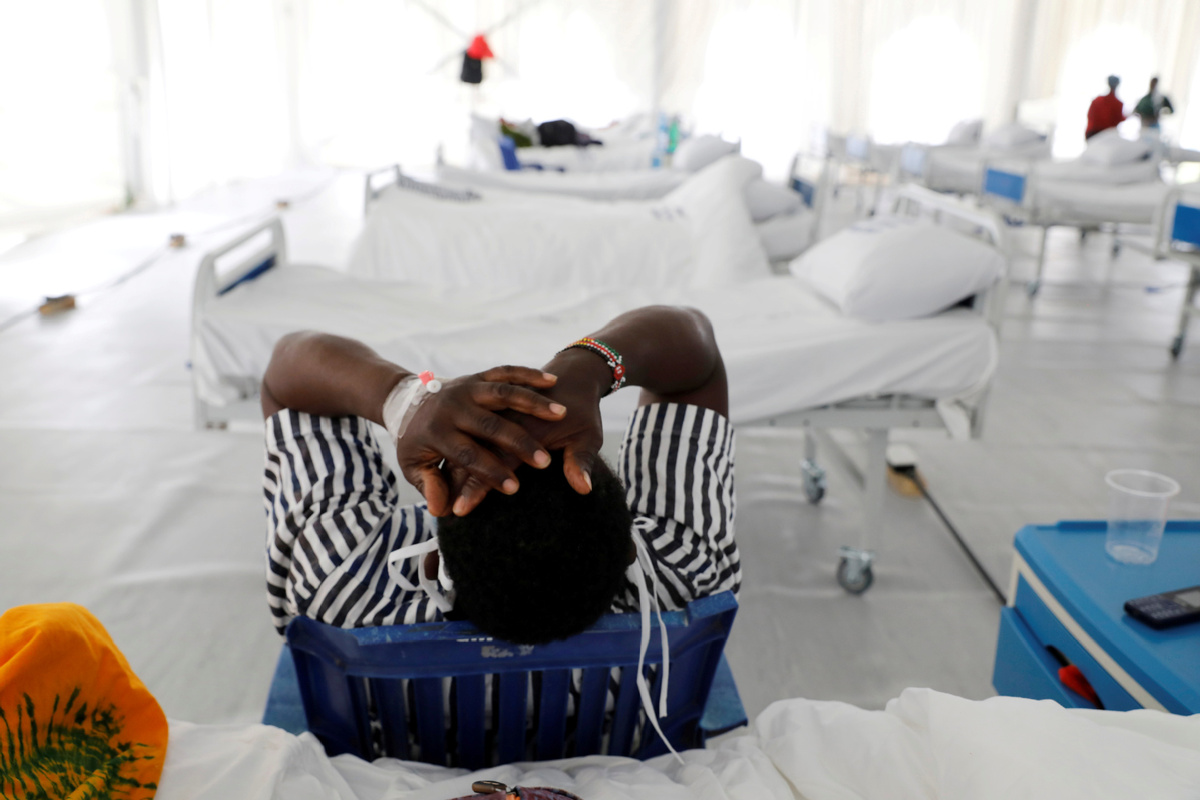COVID-19 can cause after-effects, experts say
By BELINDA ROBINSON in New York | China Daily Global | Updated: 2020-10-13 09:29

"Brain fog", shortness of breath, headaches, muscle pain, heart disease, chest pain, strokes and hallucinations-these are a few of the after-effects that patients who contract COVID-19 and later recover can experience, according to doctors and public health officials.
Others have experienced problems with their hearts, lungs, kidneys and livers. Some have lost their sense of smell and taste.
Jennifer English from Oregon City, Oregon, caught coronavirus in April and says it changed her daily life.
The 46-year-old mother of three was very active before. She would run marathons, but now she quickly becomes short of breath.
She also experiences nausea, vomiting, blurred vision, brain fog and fatigue since recovering.
"Every minute of my life is dominated by it," she told The New York Times.
Most COVID-19 patients recover without complications. But the length of time they stay ill varies.
A Center for Disease Control and Prevention document published in July said 35 percent of US adults had not returned to their usual state of health two to three weeks after testing positive for COVID-19. One in five of the respondents were 18-to 34-year-olds with no chronic medical conditions.
Even though 93 percent of the respondents were not admitted to a hospital, 43 percent still suffered from a cough, 35 percent from fatigue and 29 percent from shortness of breath.
US President Donald Trump, 74, contracted coronavirus. On Oct 2, he was admitted to Walter Reed National Military Medical Center in Bethesda, Maryland, where he spent three nights.
He has received the steroid dexamethasone, which has been authorized for use in severe coronavirus cases, the antiviral drug Remdesivir and Regeneron's antibody cocktail, which has not been authorized and is not available to most US citizens.
The potential long-term health effects of COVID-19 and the treatments the president has received are not clear.
Trump said in a video shot immediately after his return to the White House and then posted online: "I learned so much about coronavirus. And one thing that's for certain, don't let it dominate you."
But this drew criticism from people whose loved ones have died from the disease.
As of Oct 9, the virus had killed 212,343 Americans and infected over 7.5 million, according to John Hopkins University.
Globally, more than 1 million people have died, and 35.2 million have been infected.
William Schaffner, a professor of preventive medicine and infectious diseases at Vanderbilt University Medical Center in Nashville, Tennessee, said: "What we know now-and we are learning more, day by day-is that there seems to be very substantial variation (of the aftereffects) among the patients.
"Some people, even with very serious (cases of the) disease, seem to recover completely. Other people with mild infections or perhaps even no symptoms seem to develop problems that can extend for quite a few weeks. And we don't know for how long yet."
John Bonfiglio, from Waltham, Massachusetts, went to the emergency unit at Newton-Wellesley Hospital Massachusetts when he experienced coronavirus symptoms.
Seventeen days later, the 64-year-old woke up with no memory of how he got there. He once told a nurse that he thought he was in Las Vegas. He also suffered dizziness, muscle weakness and hand tremors.
Bonfiglio was later discharged and then went to Spaulding Rehabilitation Hospital in Charlestown, Massachusetts, where he spent 51 days.
He no longer suffers from any of the initial after-effects he felt, STAT News reported.
Doctors and researchers around the world are working to learn more about the health issues that follow COVID-19.
A study by the University of Frankfurt, Germany, found that 75 percent of people who had COVID-19 experienced abnormal heart conditions.
Inflammation of the heart muscles, known as myocarditis, was also identified. Myocarditis can lead to cardiac disease and failure.
Other patients experienced inflammations on the coverings of the heart, which is known as pericarditis.
Schaffner explained: "What has bothered a lot of people … is that young people who are otherwise very strong, having minor or no symptoms after they're infected, might develop at least a transient inflammation of the heart muscle-myocarditis. There is a concern that if young people become very vigorous again very quickly, then they may develop abnormalities of the rhythms of the heart."
COVID-19 has also been linked to brain damage-often described as "brain fog"-according to research released in July by the University College of London.
A study conducted with 43 participants in April and May found 10 patients had temporary brain dysfunction and delirium, 12 had brain inflammations, eight had strokes and eight experienced nerve damage.
Ian Frayling, a previously physically fit 61-year-old doctor from Wales, said he still lives with fevers, muscle pain and a persistent cough seven months after he contracted the coronavirus and was released from the hospital.
"A few weeks ago, I went shopping and started to shake uncontrollably," he told Wales Online.
"I felt completely drained of any energy and was profoundly out of breath. It took all my energy just to get back to my car, only half a mile away."























